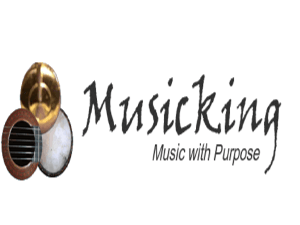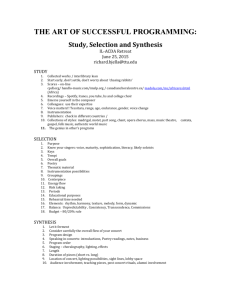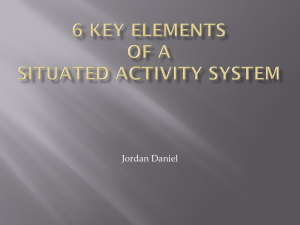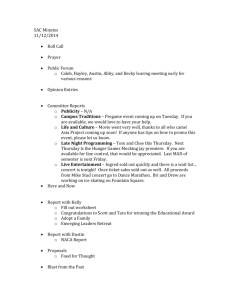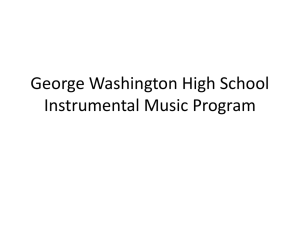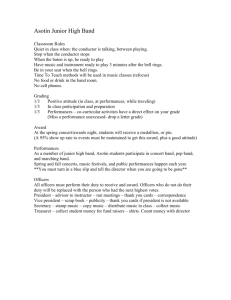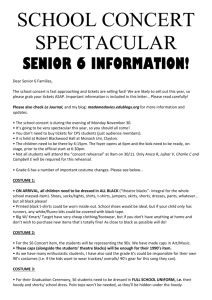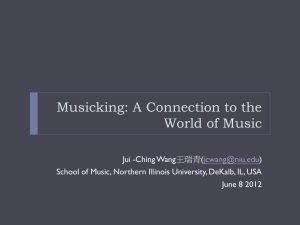HONR269Y: Live at Maryland: Engage the Arts!
advertisement
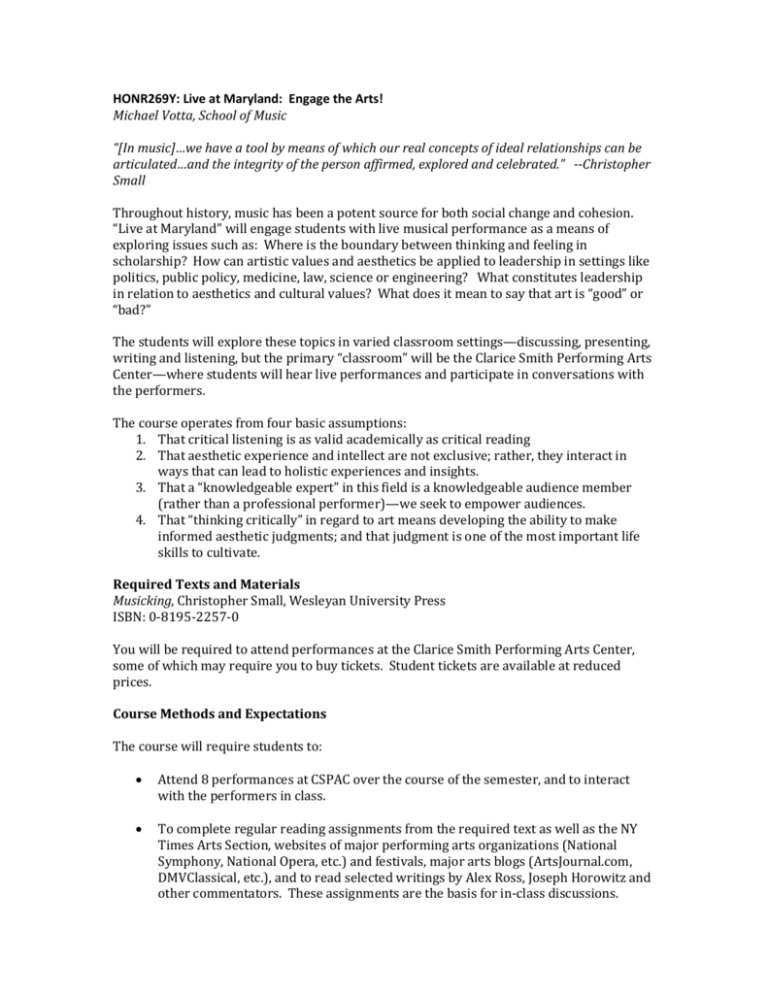
HONR269Y: Live at Maryland: Engage the Arts! Michael Votta, School of Music “[In music]…we have a tool by means of which our real concepts of ideal relationships can be articulated…and the integrity of the person affirmed, explored and celebrated.” --Christopher Small Throughout history, music has been a potent source for both social change and cohesion. “Live at Maryland” will engage students with live musical performance as a means of exploring issues such as: Where is the boundary between thinking and feeling in scholarship? How can artistic values and aesthetics be applied to leadership in settings like politics, public policy, medicine, law, science or engineering? What constitutes leadership in relation to aesthetics and cultural values? What does it mean to say that art is “good” or “bad?” The students will explore these topics in varied classroom settings—discussing, presenting, writing and listening, but the primary “classroom” will be the Clarice Smith Performing Arts Center—where students will hear live performances and participate in conversations with the performers. The course operates from four basic assumptions: 1. That critical listening is as valid academically as critical reading 2. That aesthetic experience and intellect are not exclusive; rather, they interact in ways that can lead to holistic experiences and insights. 3. That a “knowledgeable expert” in this field is a knowledgeable audience member (rather than a professional performer)—we seek to empower audiences. 4. That “thinking critically” in regard to art means developing the ability to make informed aesthetic judgments; and that judgment is one of the most important life skills to cultivate. Required Texts and Materials Musicking, Christopher Small, Wesleyan University Press ISBN: 0-8195-2257-0 You will be required to attend performances at the Clarice Smith Performing Arts Center, some of which may require you to buy tickets. Student tickets are available at reduced prices. Course Methods and Expectations The course will require students to: Attend 8 performances at CSPAC over the course of the semester, and to interact with the performers in class. To complete regular reading assignments from the required text as well as the NY Times Arts Section, websites of major performing arts organizations (National Symphony, National Opera, etc.) and festivals, major arts blogs (ArtsJournal.com, DMVClassical, etc.), and to read selected writings by Alex Ross, Joseph Horowitz and other commentators. These assignments are the basis for in-class discussions. To write essays and reports on concerts and topics discussed in class. To make class presentations on performances, the sociology of attending performances, and other issues the performance raises for them, and to discuss these issues with their peers. Potentially, groups from the class could make preperformance presentations, or host post-performance discussion with audience members. To confront the issue of artistic judgment. Is it ok to say that something is “good” or “bad” artistically? If so, what are the criteria; if not, how does one make choices? Academic Integrity The University is an academic community, and its fundamental purpose is the pursuit of knowledge. Truth and academic honesty are essential to this fundamental purpose. Accordingly, the Code of Academic Integrity is designed to ensure that the principle of academic honesty is upheld. While all members of the University share this responsibility, the Code of Academic Integrity is designed so that special responsibility for upholding the principle of academic honesty lies with the students. ACADEMIC DISHONESTY: any of the following acts, when committed by a student, constitute academic dishonesty: (a) (b) (c) (d) CHEATING: intentionally using or attempting to use unauthorized materials, information, or study aids in any academic exercise. FABRICATION: intentional and unauthorized falsification or invention of any information or citation in an academic exercise. FACILITATING ACADEMIC DISHONESTY: intentionally or knowingly helping or attempting to help another to violate any provision of the Honor Code. PLAGIARISM: intentionally or knowingly representing the words or ideas of another as one’s own in any academic exercise. You will find additional information including the honor pledge at the website of the Student Honor Council: http://www.shc.umd.edu/SHC/Default.aspx Grading Grading will be based on the quality of presentations and writing as well as demonstrated ability in class discussions. Assessment will be via in-class presentation and discussion, written essays and a final paper. There may be possibilities for extra credit though additional presentations or concert attendance. 25% 25% 25% 25% Discussions Written essays and reports Presentations Final paper (due on final exam day and time) Attendance Policy Regular attendance and participation in this class is the best way to grasp the concepts and principles being discussed. However, in the event that a class must be missed due to an illness, the policy in this class is as follows: 1. For every medically necessary absence from class (lecture, recitation, or lab), a reasonable effort should be made to notify the instructor in advance of the class. When returning to class, students must bring a note identifying the date of and reason for the absence, and acknowledging that the information in the note is accurate. 2. If a student is absent more than ___ time(s), the instructor may require documentation signed by a health care professional. 3. If a student is absent on days when in-class presentations or papers are due the student is required to notify the instructor in advance, and upon returning to class, bring documentation of the illness, signed by a health care professional. Class will be held every day that the university is open. Should some unforeseen event require class cancellation or changes in meeting times or location, students will be notified via email. In case of inclement weather or other emergency, students should check www.umd.edu for information about university closings. Students will be notified in writing (via email) about adjustments to the syllabus (grading or scheduled topics). Class lectures and other materials are copyrighted and may not be reproduced for anything other than personal use without written permission from me. Week 1 Course orientation. Visit to CSPAC: box office and venues. Resources for finding performances at CSPAC, in DC and in Baltimore Why the Sunday Times? (finding performances in the rest of the world) Performing arts on the internet Concertgoing 101: When do I clap? Rituals and Sacred Places—why and where concerts happen. Reading: Musicking: Prelude (Music and Musicking), Ch. 1 (A Place for Hearing) Week 2 The Gods We Worship—who’s who and why they are. Reading: Musicking: Ch. 2 (A Thoroughly Contemporary Affair) Who’s who In CSPAC: Who is performing this season? In DC and Baltimore: World class is downtown In the rest of the world (like Philadelphia and New York…) Concert Experience #1: Discussion and report Week 3 Foot Soldiers and Rock Stars—the world of classical musicians and conductors Reading: Musicking: Ch. 3 (A Separate World), Ch. 4 (A Humble Bow) How artists think (Visits from artists) How to walk onstage In-class movie: Music from the Inside Out CSPAC: Visit backstage areas Week 4 Come Thou, O Redeemer Spirit—the star of the show is a dead white guy (what’s up with that?) Reading: Musicking: Ch. 5 (Summoning Up The Dead Composer) Composers are human, too (visits from composers) Story-telling (students write a short autobiographical story, give it to someone else to read) Concert Experience #2: Discussion and report Week 5 Bedtime Stories—the meaning and purpose of concerts Reading: Musicking: Ch. 12 (What’s Really Going On Here?), Interlude 2 (The Mother of All the Arts) The chicken and the egg—does the concert exist for the music, or does the music exist so we can have concerts? Concert Experience #3: Discussion and Report Week 6 What’s on your iPod? —music to-go Reading: Adorno, Theodor W., “The Radio Symphony (1941),” in Essays on Music by Theodor Adorno, ed. Richard Leppert, University of California Press, ISBN 9780520231597 Class Presentations: Music on the internet (YouTube, TED, etc.) Discussion: Live performances versus recordings—a different kind of magic? Week 7 I Know What I Like—confronting artistic judgment Reading: Musicking: Postlude (Was It a Good Performance and How Do You Know?) What makes great art? When does the book move off the “fiction” shelf and onto the “literature” shelf? The “instant classic” Judgment and discrimination We strive to be non-judgmental and non-discriminatory, But we value people with good judgment and discriminating tastes Huh? Concert Experience #4: Discussion and Report Week 8 Marching to a Different Flutist—is music a universal language? Reading: Musicking: Ch. 13 (A Solitary Flute Player) Popular music rituals Art as a mirror of society Concert Experience #5: Discussion and report Week 9 Born in the USA—jazz and its rituals Reading: Musicking: Ch. 13 (A Solitary Flute Player) Art as an agent of change Improvisation Aural transmission vs. notation—who is the composer? Who guides the experience? Week 10 Music Minus Maestros—leadership issues in musical ensembles Reading: Hackman, Richard, Leading Teams, TBA Orpheus and the Orpheus Process What is a team? How do teams work? What is leadership? Chamber music: Leading and following at the same time Concert Experience #6: Discussion and Class Presentation “A Night of Questions” Daniel Bernard Roumain and UM Wind Orchestra Week 11 Concert Experience #7: Discussion and Class Presentation “Orpheus and Maryland” Orpheus and UM Music Faculty UM Faculty and Orpheus as guests Week 12 Would You Like Fries With That? —why musicians starve Reading: Musicking: Ch. 13 (A Solitary Flute Player) Art is a lousy business model. Is it a good investment? How do we measure the value of things that “money can’t buy?” How do you make money selling things that “money can’t buy?” Week 13 Concert Experience #8: Discussion and Class Presentation Week 14 Summary: Review and semester make up
